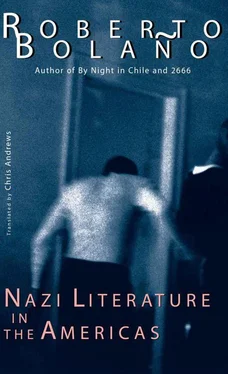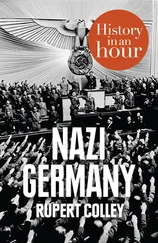Nineteen eighty-seven was also the year in which Schiaffino’s long poem “Solitude” (640 lines) was published at the expense of Dr. Morazán, who penned a preface illustrated by his niece Miss Bertha Macchio Morazán with four India-ink drawings. Solitude is an odd, desperate, turbulent text, which casts some light on obscure stretches of its author’s biography. The events take place during the 1986 World Cup, both in the host nation, Mexico, and in Argentina. Schiaffino, who is the poem’s unrivaled protagonist, reflects on the “solitude of the champions” in a seedy, out-of-the-way hotel in Buenos Aires, which sometimes seems to be an abandoned ranch far out on the vast pampas. Then we see him flying to Mexico on Aerolineas Argentinas, accompanied by “two black guards,” members of his gang, perhaps, or threatening figures. His time in Mexico is largely divided between bars of the most disreputable variety, where he is able to verify in situ the devastating effects of miscegenation (although he generally gets on well with “Mexican drunks,” who see in him a “snail prince, master of a ruined tower”) and the provincial boarding houses where he finds lodging as he follows the movements of the boys in blue and white. The final victory of the Argentinean team is an apotheosis: Schiaffino sees an enormous light hovering over Aztec stadium like a flying saucer and transparent figures emerging from the light, accompanied by little dogs with human faces and flaming fur, restrained on metallic leashes by the transparent beings. He also sees a finger, “roughly thirty yards long,” perhaps ominously pointing the way, perhaps simply indicating a cloud in the vast sky. The party continues in the “flood-locked” streets of the Mexican capital, and ends with an exhausted Fatso returning to the solitude of his boarding-house room and passing out.
In 1988, having adopted photocopying, he published a story entitled “The Ostrich” in an edition of fifty booklets. It is, at least in principle, a homage to the soldiers of the military coup, yet in spite of the Schiaffino’s evident admiration for order, the family and the Fatherland, he was unable to refrain from sallies of caustic, cruel, scatologically humorous sallies, intemperate, caricatural, parodic, irreverent outbursts — the Schiaffino trademark in short. The following year The Best of Argentino Schiaffino appeared, without a publisher’s imprint or date: a selection of his poems, stories and political writings. The cognoscenti were quick to surmise that the book had been produced by The Fourth Reich in Argentina, a mystagogically inspired venture, which kept popping up and then vanishing again in Buenos Aires publishing between 1965 and 2000.
Gradually Schiaffino began to acquire something of a media profile. He took part in a television program on soccer gangs, and was the first to defend their right to violence, on grounds such as honor, self-defense, group solidarity, and the pure and simple pleasure of street fighting. Invited as a defendant, he assumed the role of prosecutor. He participated in radio and television debates on all sorts of subjects: fiscal policy, the decadence of the young Latin American democracies, the future of the tango on the European music scene, the state of opera in Buenos Aires, the exorbitant prices of couture fashion, public education in the provinces, widespread ignorance about the nation’s extent and borders, Argentinean wine, the privatization of the country’s leading industries, the Formula One Grand Prix, tennis and chess, the work of Borges, Bioy Casares, Cortázar and Mújica Lainez (about whose work he made bold pronouncements, although he swore he had never read it), the life of Roberto Arlt (for whom he professed his admiration, although the novelist had “belonged to the enemy camp”), border incidents, how to end unemployment, white-collar crime and street crime, the inventiveness of the Argentineans, the sawmills of the Andes, and the works of Shakespeare.
He attended the 1990 World Cup in Italy, one of a group of thirty Argentinean fans classified as potentially dangerous aliens. Prior to the trip he had expressed a wish to meet with the British hooligans for a reconciliation ceremony consisting of a mass for the casualties of the Falklands War, followed by a barbecue. Although it was never anything more than a wish, the news spread around the world, and by the time he returned to Argentina, Schiaffino’s renown had increased considerably.
In 1991 he brought out two books: Chimichurri Sauce (self-published, forty pages, 100 copies), an unfortunate imitation of Lugones and Darío, lapsing occasionally into pure plagiarism, which left all but a few readers wondering why he had written and, having written, published it; and The Iron Boat (La Castaña, 50 pages, 500 copies), a series of thirty prose poems whose central theme is the phenomenon of friendship between men. The book’s trite message, that friendship is forged in danger, seems in retrospect to foreshadow the life that Fatso was to lead in the coming years. In 1992, commanding a substantial group recruited from his gang, he orchestrated the ambush on a public highway of a bus carrying River Plate supporters, resulting in two deaths from gunshot wounds and numerous injuries. A warrant for his arrest was issued; Argentino Schiaffino disappeared. In phone calls to various radio stations he vigorously declared his innocence, although he did not condemn the ambush — on the contrary — and several witnesses, including more than one ex-member of Schiaffino’s gang, said they had seen him near the scene of the crime. In the media he was soon identified as the mastermind and instigator of the incident. Here begins the shadowy phase of his life, especially propitious to all kinds of speculation and mystification.
While on the run, he is known to have attended soccer matches: photos he set up himself showed him rooting for the team like any other fan. The gang, the inner circle of the gang, those who had stood by the Schiaffino boys from the start, protected him with a fanatical devotion. His life on the run inspired awe among the youngsters. A few read his works; some imitated him and tried to follow his literary lead, but Fatso was inimitable.
In 1994, when the World Cup was being played in the United States, Fatso gave an interview to a Buenos Aires sports magazine. Where was he? In Boston. A major scandal broke out. The Argentinean sportswriters became suspicious after being subjected to special security measures — slights, so they felt, to their professional dignity — and commented sarcastically about the North American police procedures. The other Latin American journalists, plus a few from Spain, Italy and Portugal, echoed their mockery. The story, just one of the many generated by the event, was repeated around the world. The Boston police and the FBI swung into action, but Schiaffino had disappeared.
For a long time, his whereabouts were entirely unknown. The gang even publicly admitted to being in the dark, until Scotti Cabello, who was in prison, received a long poem entitled “Terra autem erat inanis” in a letter from Fatso, postmarked Orlando, Florida. The epistle, which Dr. Morazán hastened to publish, obliging the Boca fans to pay a subscription, begins with a comparison, in rhythmic free verse, of the open spaces of North America and those of Argentina, at opposite extremes of the continent, continues with detailed reminiscences of the prisons that “the author and his friends” have come to know through their “enthusiasm and innocence” (a clear allusion to the two-year sentence that Scotti Cabello was serving at the time) and ends in a chaotic blend of threats and idyllic visions of a childhood paradise regained (mamma, the smell of fresh pasta, brothers laughing around the table, playing soccer in vacant lots with a plastic ball until nightfall) and irreverent, off-color jokes, a characteristic trait of Schiaffino’s late manner.
Читать дальше












